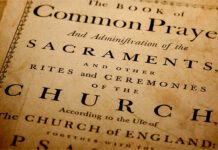[I have discovered from my recent tweets about the language of our worship and prayer that while many agree, several are confused. Some wonder why this fascination with the old and the traditional. Others think I’m simply an unlikely champion of the “good ol’ hymns.” In an attempt to provoke more discussions amongst yourselves– worship leaders, worship teams, songwriters, etc.– I have formulated the three most frequent objections I’ve heard…and I’ve attempted a response. If my response is severe, it’s because I believe the issue is.]
“Worship songs” are not just “expressions of our hearts to God”; they shape what we believe about God. In the first 1600 years or so, few dared to write “their own songs” for congregational worship. The first prayers and songs of the Church were Psalms (prayers they learned as Jewish children) reframed around Christ. By the end of the 1st century, we see a few creedal formulas surface, many of which are quoted in Paul’s letters. Later, when more songs and liturgies were written, they were carefully worded by theologians like John Chrysostom in the 4th century (whose liturgy the Orthodox Church still sings!) and much later, Luther in the 16th century. For many centuries after the Reformation, songs written for public worship had to have words taken directly from Scripture. Today, we are loose about it. We sit down– and I say “we” because I have been guilty of this– and try to write a song based on what’s in our hearts, what we want to say, what my Church wants to sing…all of which may be OK if they are subservient to the larger question, “What is true about God?” Still, some insist…
1. “It’s the Heart that Counts.”
Tell that to Nadab and Abihu– you know, the guys who offered a “strange fire” and got struck down in Numbers 3. Or Uzzah, the guy who was struck dead for touching the Ark that was sliding off a cart it should never have been on because David did not “seek the Lord about the prescribed manner.” Where did we arrive at the notion that God does not care about the way that we worship? Or that all that matters is our heart? What only adds to the muddle is the confused notion about what the “heart” is. We have been shaped by the Romantic Era so that when we hear “heart,” we think “intention” or “desire.” But in the Scripture, the “heart” is the seat of the will. It is where action comes from.
But here’s the real question: Are you sure that your words and your heart are two separate things? Can you sing “bad” words but have a “good” heart? Jesus seemed quite clear that our words always betray what’s in our hearts. Perhaps our words in worship reveal what we really believe about God in our hearts. This is point of the whole Lex Orandi, Lex Credendi, Lex Vivendi thing. It’s the conviction that the way we worship = the way we believe = the way we live. It’s not just a clever Latin phrase from a long time ago. Is it an accident that along with the rise of “popular worship songs” devoid of the words and content of the creeds and confessions of the Church has come the rise of a new religion, Moralistic Therapeutic Deism, that many think is “Christianity”? Have our words of prayer and worship become so generic that most of what we sing can be just as easily sung to Simba the Lion King or, better yet, Oprah’s ‘God’?
The Bible also tells us that our heart is desperately wicked. Scripture and the historic creeds and confessions of the Church (that were either based on Scripture or were themselves the basis for selecting the Canon of Scripture) are like iron stakes, driven into the ground on either side of a young tree. Without them, our worship grows crooked.
2. “What We Really Need Is the Spirit to Show Up.”
Immediately I want to ask, “Which Spirit?” and “How will you know it’s Him?” What this statement may reveal is a fixation on an experience. But Christians don’t gather together so they can “experience God” as if it’s a sanctified frat party. We gather to pay attention to God– His presence in the Sacraments, His voice in the Scriptures, His Spirit in His people– and to pay attention to one another– our companions on the way of the cross. To say it’s all about God “moving” in a service is to leave that up to a subjective experience of whether He “moved” or not. If we aren’t careful, we may think that as long as we danced/cried/shouted/were moved/etc. then it doesn’t matter if what was said or sung was actually about Father, Son, and Holy Spirit. This is letting Experience define Truth instead of letting Truth define Experience. It’s a bizarre non sequitur: “I feel it; therefore, it is true.” No one would actually say this, but our actions may indicate that we are more concerned with “what the experience of God is like” than “who the God of the experience is.” Pardon me for being crude, but that’s a bit like saying, “As long as the sex is good, I don’t care whom it’s with.” And, indeed, that seems to be the motto of our culture. But if we are to be Christ’s Bride and not Bablyon’s whore, we can’t qualify a worship service filled with sloppy theology by how good it felt. Our worship must begin with the question, “What is true about God?” not “What do I want/need/expect to feel?”
Oh, and by the way, every time the People of God gather in Christ’s name, the Spirit of God is there. You (plural!) are the Temple of the Holy Spirit. He is present when we gather. The discipline of gathering weekly to worship is one of learning to pay attention to Father, Son, and Holy Spirit, not to have a group sensation.
3. “We Need to Be Free to Express Ourselves in Our Own Way.”
Resisting the urge to refer again to the aforementioned Nadab and Abihu, I will say, instead, that you are free to do lots of things. You are free to worship a false god if you’d like. You are free, as Adam and Eve were, to try to be god-like instead of reflectors of the Image of God.
“Freedom” is another convoluted word, muddied by the Romantic Era and the American Revolution. “Freedom” in the American sense is quite different from “Freedom in Christ.” Jesus didn’t die to give us free speech; He died to set us free from the law of sin and death at work in us. Our culture has idolized autonomy and called it “freedom.” We like innovation and not imitation because innovation is an expression of independence, and imitation is proof of dependence. But Biblical worship has nothing to do with the arrogant and the independent. If you insist on making this about “expressing yourself,” you will find yourself more at home with the Golden Calf than with the God of Abraham, Isaac, and Jacob. After all, the Golden Calf was an image Israel was familiar with, an “expression of worship” they knew and that made sense to them. You cannot fashion YHWH in your image; you are fashioned in His image, which is why there is a “prescribed way” to worship Him. It takes humility to say, “I don’t really know how to worship.” It takes humility to ask, as the disciples did, “Lord, teach us how to pray.” And then to listen to the words of the Lord’s Prayer and let those words shape the language of your prayer. Can we pray our own prayers and write our songs from our heart? Of course. But we would do well to let our language first be shaped by Psalms, Scripture, and the historic creeds and confessions of the Church.
As children, we learned to speak by being spoken to. Our mother or father says, “Ball,” and we watch their mouth and try to say it back to them. Then we say it with them. Soon we say it on our own. Then we speak on our own. But not with “our own words.” That would be gibberish. We speak the words spoken to us. So with worship and prayer: Speak, sing, pray the Word that has been spoken to you. Or as Paul wrote, “Let the message of Christ dwell among you richly as you teach and admonish one another with all wisdom through psalms, hymns, and songs from the Spirit, singing to God with gratitude in your hearts.” (Col. 3:16)
[I’m sure I’ll write a follow-up post with some recommendations of books on Psalm-praying or sources of the ancient creeds and confessions. But for now, the diligent can find them. Part of the education is in the search, right? :)]












